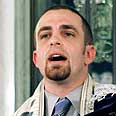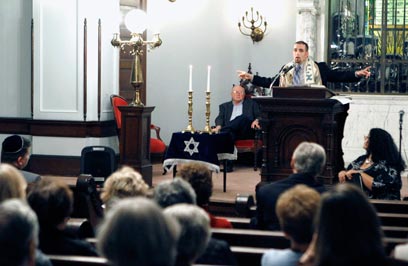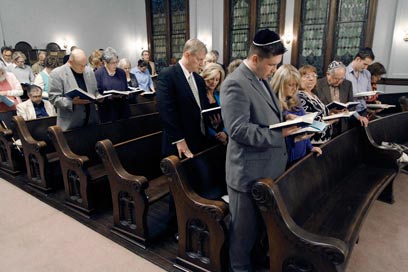
Only about a dozen Jewish residents remain in Natchez, a city of about 16,400 best known for its elaborate plantation homes. As younger generations moved away, the congregation hasn't had its own full-time rabbi since 1976.
With a circuit-riding rabbi visiting on this Friday night, about 80 Catholics, Episcopalians, Presbyterians, Baptists and Methodists joined their Jewish neighbors and helped fill the wooden pews of the 105-year-old temple.
Rabbi Marshal Klaven gave people an extra 10 minutes to slip in before the service, joking that under "Jewish Standard Time," it's not unusual to run late.
"This is Shabbat. It's a time of joy. It's a time to get to know one another," Klaven said. "So I invite you right now: Go and say hi to somebody you don't know. Say, 'Shabbat, shalom,' which means, 'The Sabbath, peace.'"

'Circuit riding' rabbi preaches (Photo: AP)
Klaven serves small Jewish communities in 13 states across the south, from Oklahoma to Virginia and from Kentucky to the Florida panhandle.
The 31-year-old St. Louis native has worked since last summer for the Goldring/Woldenberg Institute of southern Jewish Life in Jackson, Miss., where his office has a hand-stitched sign featuring a Star of David and the slogan, "Shalom Y'all."
This is Klaven's first full-time job since finishing rabbinical school, and he's the third traveling rabbi since the institute started hiring them 2003. Each works a three-year contract.
Klaven bungee jumps for fun, has worked as a US Air Force chaplain and, years before becoming an Eagle Scout, says he was booted out of religious school as a preteen for laughing too hard at a flatulence joke.
He travels the rural south in rented cars, working with congregations that are too small to sustain their own full-time rabbi. Klaven, who is single, sometimes works in three or four small communities a weekend, performing weddings, leading Shabbat services and visiting congregants who are ill.
During Passover week, he planned to be in Vicksburg, Miss.; Bowling Green, Ky.; and the northern Georgia towns of Rome and Dahlonega.
"During the Exodus, I'll literally be doing an exodus," he joked.
'Gets to meet every Jews in south'
Natchez is home to Mississippi's oldest Jewish congregation, dating back to 1843. The current temple was built in 1905.
"It's a struggle to keep it open," said congregation president Jay Lehmann. "I used to say I was the youngest member of the congregation. I'm 67. We've gotten a few people who have moved to town that are a little bit younger than me. But there's no one under 40 at all."
A quartet called the Shirim Ensemble had also traveled from Jackson to participate in the Friday evening service, performing ethereal holy music in Hebrew and English.
Klaven sprinkled his lesson with pop culture references, quoting composer Aaron Copland, singer-songwriter Paul Simon and even the movie "Happy Feet."
He also blessed Elizabeth Massey and Andrew Fagan of Bettendorf, Iowa, who had come to Natchez to be married days later in one of the white-columned plantation homes. Massey is Baptist and wanted to return to her native Mississippi for her wedding; Fagan is Jewish and grew up in the Midwest.
Klaven took a prayer shawl from around his neck and handed it to the fathers of the bride and groom, who held it over the couple's heads as the rabbi spoke to them quietly. Aunts snapped pictures, and a cousin videotaped the ceremony. After the blessing, Klaven draped the shawl back around his neck.
Days before going to Natchez, Klaven said he hopes to visit at least 10 states this year. He pointed to a map in his Jackson office that showed the 133 Jewish congregations in his territory that don't have a full-time rabbi. Tiny circles were marked with U for unaffiliated, R for reform, RE for reconstructionist, C for conservative and O for orthodox. He serves any congregation, he said, according to its own style of worship.
"Many people when I took this job said, 'What are you doing, moving to the south? There's no Jews there,'" Klaven said.

Catholics, Episcopalians, Baptists and Methodists join Jewish neighbors at Temple B'nai Israel (Photo: AP)
About 2.2% of people in the US are Jewish, according to a 2004 Census estimate, the most recent figure available. The numbers are much lower in most of the south, except for Florida. The Census said the Jewish population ranged from less than one-tenth of 1% in south Carolina to 1.4% in Georgia.
Klaven said he has learned a valuable lesson in the south: In large Jewish congregations, it's easy to assume someone else will pray or will get involved in community projects.
"And these small communities know that there is nobody else," Klaven said. "If they don't go, Judaism does not exist in these towns."
Macy Hart, president and CEO of the Goldring/Woldenberg Institute, said other small US communities face the same kinds of problems as the Jewish community in Natchez. The economy changes and younger people move to larger cities and congregations struggle to survive.
"It's not a southern issue," Hart said. "This is a national problem."
And, Hart said, it's not limited to Jewish communities. Other faith groups, including Catholics, are stretched to find enough clergy.
Beau Baumgardner, who worked as a real estate developer in Pennsylvania and New Orleans, retired to Natchez about five years ago and attends B'nai Israel. He said Klaven's intelligence and sense of humor make him a good fit for small congregations.
"Oh, he's got a fantastic job," Baumgardner said. "He gets to meet every Jew in the south."















